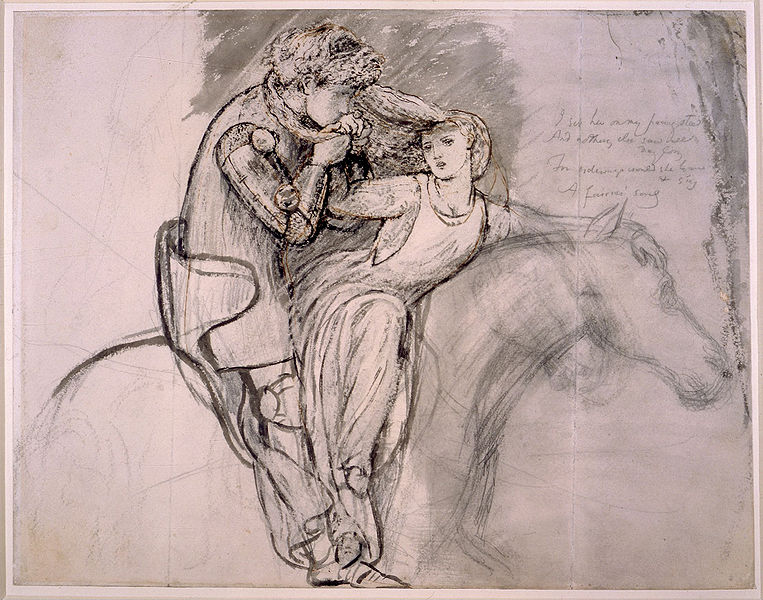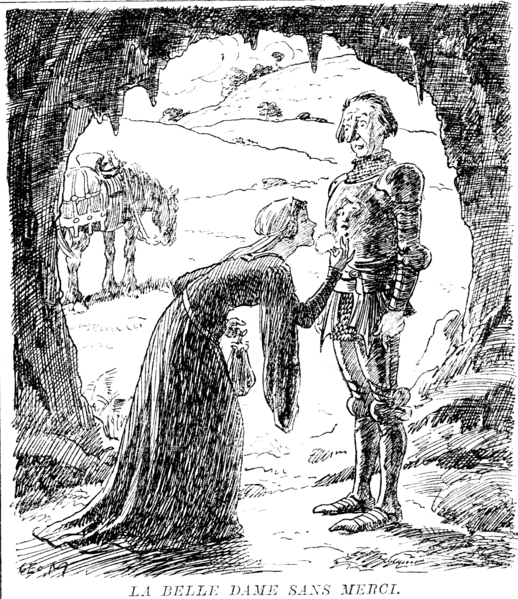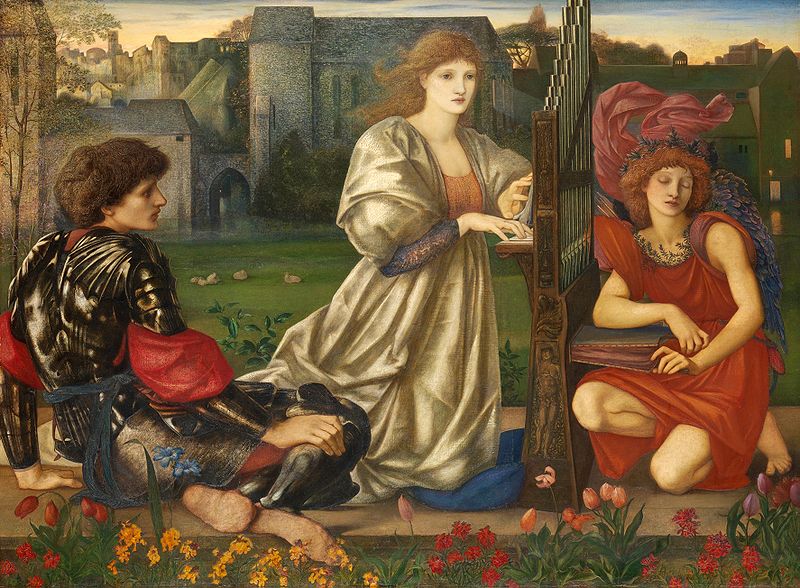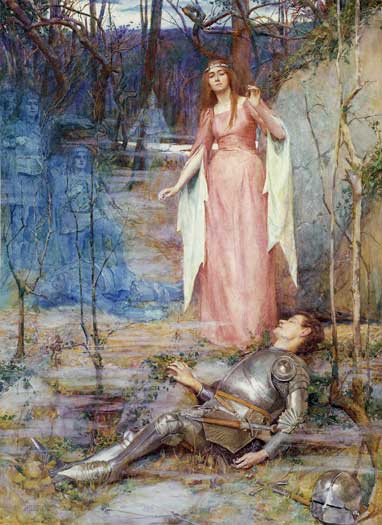.

La Belle Dame sans Merci: Dante Gabriel Rossetti, c.1855 (British Museum)
O what can ail thee, knight at arms,
..Alone and palely loitering?
The sedge has wither'd from the lake,
..And no birds sing.
..Alone and palely loitering?
The sedge has wither'd from the lake,
..And no birds sing.

Lady Affixing Pennant to a Knight's Spear: Elizabeth Siddal, 1861
O What can ail thee, knight at arms,
..So haggard and so woe-begone?
The squirrel's granary is full,
..And the harvest's done.
![[ffms.jpg]](https://blogger.googleusercontent.com/img/b/R29vZ2xl/AVvXsEiayDpv5V6nxNekiZGZzoZzoaJpKG1tITr6LjzGX65I3si0JxIG98LYrRogHklLNLqQRcImuL4sMxAGPMoKnE1M2fREAGpGcyuu4aNAJBaxT_rdiS_1LQgVPWO3mfAztWRtvx8RvyKc0o39/s1600/ffms.jpg)
Fairy Feller's Master Stroke: Richard Dadd, 1855-1864 (Tate Gallery)
I see a lily on thy brow
..With anguish moist and fever dew,
And on thy cheeks a fading rose
..Fast withereth too.
..With anguish moist and fever dew,
And on thy cheeks a fading rose
..Fast withereth too.
I met a lady in the meads,
..Full beautiful, a fairy's child;
Her hair was long, her foot was light,
..And her eyes were wild.
..Full beautiful, a fairy's child;
Her hair was long, her foot was light,
..And her eyes were wild.
I made a garland for her head,
..And bracelets too, and fragrant zone;
She look'd at me as she did love,
..And made sweet moan.
..And bracelets too, and fragrant zone;
She look'd at me as she did love,
..And made sweet moan.
I set her on my pacing steed,
..And nothing else saw all day long,
For sidelong would she bend, and sing
..A fairy's song.
..And nothing else saw all day long,
For sidelong would she bend, and sing
..A fairy's song.
La Belle Dame sans Merci: Frank Bernard Dicksee, 1890
She found me roots of relish sweet,
..And honey wild, and manna dew,
And sure in language strange she said—
..I love thee true.
..And honey wild, and manna dew,
And sure in language strange she said—
..I love thee true.
![[LaBellDameSansMerci_Crane.jpg]](https://blogger.googleusercontent.com/img/b/R29vZ2xl/AVvXsEi6zjxlLwnJQ5E378AQ9r8ZRT_kw1NIl8t11NjxL-NhT35-BEil6M2XD23WfW1Wo766oi2KZKKCS2aPYr-VcqKtGe6DrsTgR0aGxmRB10aNMS5N3S8tK0TPFgmA48XZ4Mt_rfEGZtp-8Ev_/s1600/LaBellDameSansMerci_Crane.jpg)
La Belle Dame sans Merci: Walter Crane, 1865
She took me to her elfin grot,
..And there she wept, and sigh'd full sore,
And there I shut her wild wild eyes
..With kisses four.
..And there she wept, and sigh'd full sore,
And there I shut her wild wild eyes
..With kisses four.
And there she lulled me asleep,
..And there I dream'd—Ah! woe betide!
The latest dream I ever dream'd
..On the cold hill's side.
..And there I dream'd—Ah! woe betide!
The latest dream I ever dream'd
..On the cold hill's side.
I saw pale kings, and princes too,
..Pale warriors, death pale were they all;
They cried—"La belle dame sans merci
..Hath thee in thrall!"
..Pale warriors, death pale were they all;
They cried—"La belle dame sans merci
..Hath thee in thrall!"
I saw their starv'd lips in the gloam
..With horrid warning gaped wide,
And I awoke and found me here
..On the cold hill's side.
..With horrid warning gaped wide,
And I awoke and found me here
..On the cold hill's side.

La Belle Dame sans Merci: Frank Cadogan Cowper, 1926
And this is why I sojourn here,
..Alone and palely loitering,
Though the sedge is wither'd from the lake,
..And no birds sing.
..Alone and palely loitering,
Though the sedge is wither'd from the lake,
..And no birds sing.

La Belle Dame sans Merci: artist unknown, from Punch, or The London Charivari, Volume 159, 1 December 1920
La Belle Dame sans Merci: A Ballad: John Keats, 21 April 1819







Tom,
ReplyDeleteAye, these paintings make Keats' great poem come alive (or back again, like last night's dream) -- "The sedge is withered from the lake,/ And no birds sing". . . .
12.5
orange edge of sun below black branches
of trees, shadowed green leaf on branch
in foreground, sound of wave in channel
what is concealed, “meaning”
that there would then
this place, even if picture
has always, some time
grey-white clouds reflected in channel,
whiteness of gull gliding toward point
Tom...As you perhaps know, in the original version, dated in the text I have as April 28, 1819, the last line of the tenth stanza reads "Thee hath in thrall" and in the revised version, dated "before May 10, 1820" Keats changed it to "Hath thee in thrall!" Pardon the pedanticism - I find the change interesting.....
ReplyDeleteI love it!!
ReplyDeletehttp://cars-are-stars-remotely-far.blogspot.com/
Simon, Darya, Steve, many thanks.
ReplyDeleteBill, the textual history is much fretted. This is not the place to elaborate, but in brief, there are four extant MSS, the holograph draft in Keats's letter to his brother George and sister in law Georgiana of April 21-28, 1819; a transcript, presumably from a fair copy made by Keats, by his housemate Charles Brown; and two transcripts by his friend Richard Woodhouse.
I have followed Jack Stillinger's definitive modern edition of the Poems (Harvard, 1978) in using the Brown version -- which, indeed, has generally been accepted as the standard text.
(This despite the stubborn insistence on the part of certain editors, principally Jerome McGann, in following the degraded text printed in May 1820 in Leigh Hunt's Indicator; the rationale for this insistence comes down to the fact that Keats was still alive at the time; but he was gravely unwell, and the Indicator revisions, I think, show the hand of an over-busy Hunt not of an incapacitated and distracted Keats. And in any case no MS for the Indicator version survives.)
...By the by, like most good stories, this one has been around for a while...
ReplyDelete